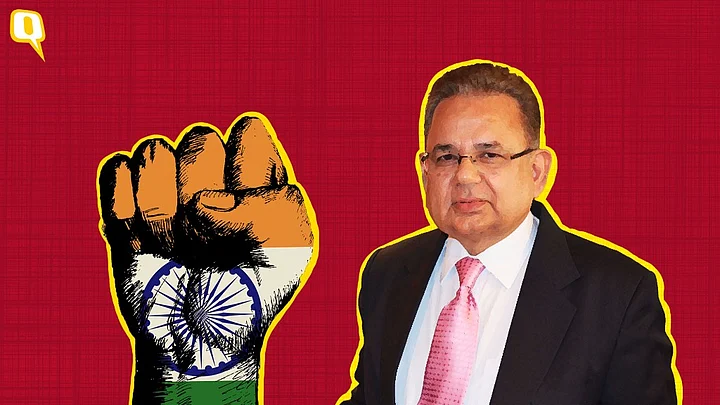India fought hard and it fought damn well. The Narendra Modi government had made it clear from the very beginning that it wanted to win this contest against the United Kingdom for a seat at the International Court of Justice (ICJ).
The re-election of Justice Dalveer Bhandari was categorically a positive affirmation of Indian diplomacy. This was the first time that a permanent member of the United Nations Security Council (UNSC) was in direct contest with a non-member for the post of a judge at the ICJ. And India clinched the deal in the end.
Bhandari was re-elected to the ICJ after the UK withdrew its candidate Christopher Greenwood from a hard-fought race to the world court, unable to challenge the will of the General Assembly which overwhelmingly threw its weight behind India.
Prime Minister Modi congratulated Justice Bhandari on his re-election to the ICJ saying it was “a proud moment” for India, while crediting Minister of External Affairs Sushma Swaraj and her team for this victory.
Swaraj herself reportedly made around 60 phone calls to her counterparts across the world in the past few days to canvass for Bhandari’s candidacy, thereby leading from the front as her ministry lobbied hard – and it paid off handsomely.
Despite Bhandari reportedly polling two-thirds of the members of the General Assembly in the first 11 rounds, British hopes remained alive in the UNSC as UK’s Christopher Greenwood continued to get backing from nine members as against five for Bhandari.
Major Setback for the UK
There were some suggestions that the UK would resort to the ‘joint conference mechanism’ to get its man in despite legal opinion being against it.
But this was viewed as problematic by the UK’s European partners and even the US made it clear that growing support for Bhandari would only result in deadlock and loss of face. Bhandari finally obtained an absolute majority, or 183 of the 193 votes in the United Nations General Assembly and all 15 votes in the Security Council in simultaneous elections that were held at the UN’s headquarters in New York.
This is certainly a big setback for the UK as for the first time in 71 years, a UK judge will be absent in the UN court. Post-Brexit, the UK’s global standing has been damaged and it is not clear if it can be redeemed in the short to medium term given the scale of challenges facing the country.
Just this week the European Medicines Agency (EMA) decided to relocate from London to Amsterdam, and the European Banking Authority (EBA) to Paris. While many in the UK may want to chart out a new course as a ‘global Britain,’ the rest of the world remains sceptical and views the country as one turning rapidly inwards.
A Shift in Power
The UK is putting up a brave face. Its foreign secretary Boris Johnson dismissed the idea that the defeat of Christopher Greenwood was a failure of British democracy, arguing that “it has been the long-standing objective of UK foreign policy to support India in the United Nations.” Britain’s permanent representative to the United Nations Matthew Rycroft has also said:
If the UK could not win in this run-off, then we are pleased that it is a close friend like India that has done so instead. We will continue to cooperate closely with India, here in the United Nations and globally.Matthew Rycroft, Britain’s Permanent Representative to UN
But there is no denying the fact that this win for India is indicative of the underlying shift in the global distribution of power.
The old powers are no longer able to hold their ground and the emerging powers are willing and increasingly able to challenge the old world’s stranglehold over the global institutional architecture.
Reason to Celebrate India’s ICJ Victory
Global institutions invariably reflect the extant distribution of power. Most of the global governance structures were erected in the post Second World War phase and are incompatible with today’s power structures. This is the reason India has been demanding their restructuring.
Some might be tempted to see India’s victory at the ICJ as a shot in the arm for India’s pursuit of a permanent membership in the UNSC. But caution should be the norm in that regard as the unique structure of the Security Council, where the five permanent members have a right to decide on their future precludes any outside intervention.
As for India, China remains the biggest roadblock in the Security Council even though the remaining five remain favourably disposed to India’s entry into the group. For now, however, there is every reason to see this victory at the ICJ as a significant one both for India and well as the emerging world order.
(Harsh V Pant is Distinguished Fellow and Head of Strategic Studies at Observer Research Foundation, New Delhi. This is an opinion piece and the views expressed above are the author’s own. The Quint neither endorses nor is responsible for the same.)
(Breathe In, Breathe Out: Are you finding it tough to breathe polluted air? Join hands with FIT to find #PollutionKaSolution. Send in your suggestions to fit@thequint.com or WhatsApp @ +919999008335)
(At The Quint, we question everything. Play an active role in shaping our journalism by becoming a member today.)
